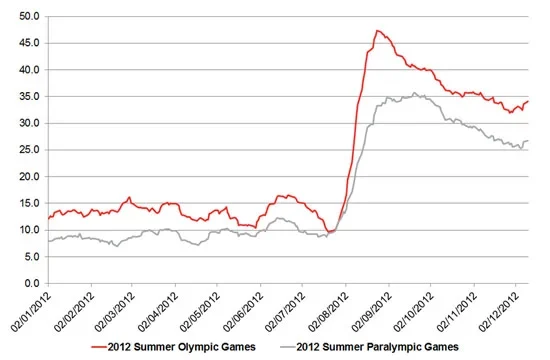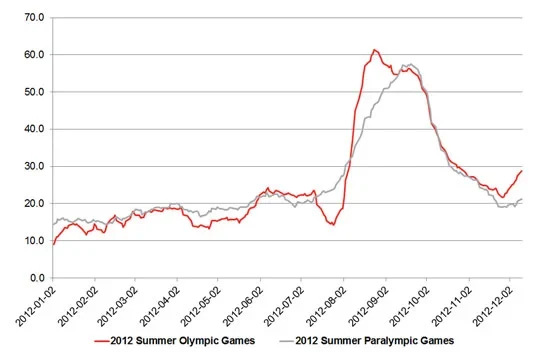Stephan Shakespeare looks at the ups and downs enjoyed by the London 2012 brand over the last year
As each year draws to a close I like to look back over YouGov’s BrandIndex and consider the big gainers and fallers of the previous twelve months.
Usually this involves examining Britain’s most recognisable corporate brands, such as last week when we looked at how the competition between department store giants John Lewis and Marks & Spencer has become increasingly fierce of late.
But the most high-profile success story of 2012 was of course the Olympic Games, and so this week rather than considering a company’s brand performance, let’s take a look at the ups and downs enjoyed by the London 2012 brand over the last year.
Sporting rollercoaster
The story from January to September is a well known one – staunch scepticism throughout the build-up to the Games was eclipsed by mass enthusiasm and positivity once the contests started.
The Index score for the Olympics leapt from +10 to +47, while the Paralympics jumped from +9 to +36, peaking slightly lower and slightly later to coincide with the start of the second phase of the competition.
But what has happened since then?
Index Scores

Post-games Buzz
As one would expect, Buzz (hearing positive or negative news) has steadily fallen back to close to its pre-Games levels in the mid +20s, having got as high as +61 for the Olympics and +58 for the Paralympics.
As we are no longer hearing daily stories of Olympic stars, the latest gold tallies and our new favourite sports, it is to be expected that buzz would die off quickly.
Buzz Scores

What is interesting, however, is the sustained high levels on the Index score (which is made up of a composite of six key image attributes).
There has been a decline, but it is a slow one, and scores remain well above those of the first half of the year.
As of Monday, the Olympics remained at +34 and the Paralympics at +27.
We all know what a triumph London 2012 was, and that success is reflected in what boils down to a legacy of happy memories among the British public.
How very different perceptions look in December than they did in January.






